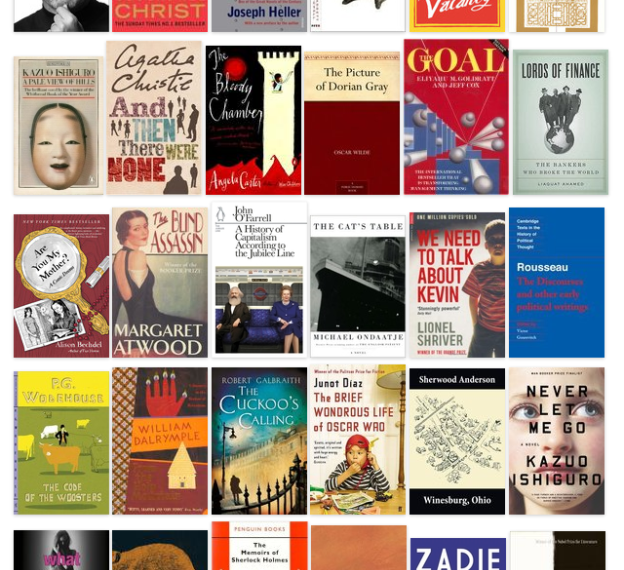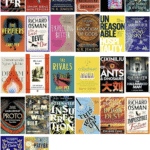Success! For another year running, I’ve managed to meet my target of reading at least one more than last year’s total. And here they were:
Having discovered Ishiguro last year, in 2013 I greedily went back for more with A Pure View of Hills and Never Let Me Go. The latter was probably my favourite, although the theme of lying – mostly to ourselves – is always present in his works, and always compelling. Never Let Me Go is more subtle than a great social conspiracy: the characters are ‘told and not told’ about their world, which is very resonant. Truth, lies and storytelling is also central to Pullman’s short The Good Man Jesus and the Scoundrel Christ but the story hasn’t stuck with me nearly as much. Perhaps it comes down to what you read as a child, but the image of the afterlife in His Dark Materials has always stayed with me as a frightening depiction of what religion would really entail. Nothing here came close in lasting imagery.
Someone else who got two books into my list this year was J.K. Rowling. I love J.K. Rowling, and I love how much gluttonous pleasure I get from her books in the same way (and this is my only Harry Potter comparison) that reading Harry Potter was addictive, and preferable to eating, sleeping or talking to real people. I mean, The Casual Vacancy was a joy, and an especially indulgent joy because it felt like a friend’s very funny skewering of a shared target: little England. There are plenty of other, more uncomfortable books to critique the flaws and hypocrisies of the city-dwelling, metropolitan middle class. (Cough.) But this was aimed at the snobbish claustrophobia of the suburbs instead, and felt like a better take down of the Daily Mail than any direct attack. That they obliged in calling it a “relentless socialist manifesto masquerading as literature crammed down your throat” by a “blinkered, Left-leaning demagogue” in return is the icing on the cake. I have less to say about The Cuckoo’s Calling, other than I also enjoyed it immensely and look forward to further adventures of Cormoran Strike.
And Then There Were None wins the award for most atmospheric read of the year: alone on a darkened evening in a quiet Welsh B&B, before getting to the end and wondering if anyone was going to jump out and kill me on my way to dinner. The Bloody Chamber was wonderful. (Does everyone else love Angela Carter yet? Good.) The Picture of Dorian Grey was flawed but interesting and confusing: what is Wilde trying to say about his own philosophy? The Blind Assassin was good but over-long, and that’s about all the emotion it summons up in me. I approached Neil Gaiman’s Neverwhere with some hesitation, as it seemed that a fantasy novel set in a shadowy London underworld stuffed with Underground references was too good to be true, and bound to be a disappointment. Instead, I loved it, and it left me wanting more adventures in that world. And then right at the end of the year I ‘discovered’ Doris Lessing (to the extent that you can discover a Nobel prize-winning author first published in 1950) with the sad, haunting, sometimes scary The Grass Is Singing. Will definitely return to her in the next few years.
This year, the balance of injecting new authors alongside those I’d already read came largely from Book Club at work, and I’m really glad for it. Some of them I didn’t instinctively love (The Interrogative Mood, Are You My Mother?) but the discussion was always enjoyable and often made me retrospectively enjoy reading it, if that makes any sense at all. (Oh, the lies we tell ourselves…) Winesburg, Ohio just makes you want to shake the whole town and tell them to stop being so introspectivey European on us. And I think it’s almost a cliché for book clubs to read and then disagree massively on We Need To Talk About Kevin. Some hated it, some loved it… and I was kinda in the middle. I wanted to turn the (virtual) pages to find out what happened next, but the central characters seemed so absurdly distant from my actual experiences that it didn’t really matter much.
A more grounded view of growing up came from Melissa in What Should We Tell Our Daughters? – one of only a few non-fiction books this year. My abiding memory is reading this on the train, with Michele reading it over my shoulder and expressing frequent agreement, and just occasionally feeling a slightly hopeless feeling of ‘oh, the injustices are so layered and tug in so many different directions’. Lords of Finance was enjoyable although what stuck with me most was less about central banking and more about the sheer stupidity of the Treaty of Versailles, which is well trodden ground but well remembered as we go into 2014. And William Dalrymple’s From the Holy Mountain was somewhat infuriating, because despite being well-written and informative about a part of the world I’ve never seen, it assumes too much complicity from the reader in accepting that the decline of Christianity in the Middle East is something to be mourned beyond the immediate human suffering endured by its adherents.
I’ve already been on a book buying splurge for next year 😀








